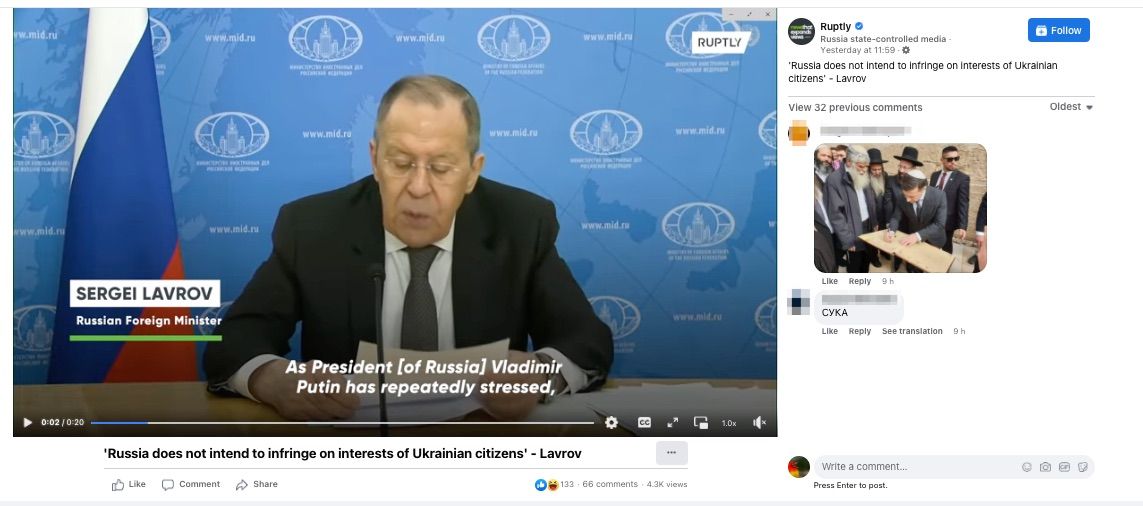Facebook’s Measures Against RT and Sputnik Fail to Address Root Problem of Information Warfare
Fadi Quran / Mar 21, 2022CrowdTangle Data Shows Restrictions on Russian State Media Leave Arabic and Spanish-speaking Users Behind

Fadi Quran is a campaign director at Avaaz, a global movement to bring people-powered politics to decision-making everywhere.
In response to the war in Ukraine, the European Commission introduced widespread bans on Russian state-controlled outlets known to spread propaganda and misinformation. Then, Facebook announced that it would restrict access to Russia Today (RT) and Sputnik from users in European countries.
But new research from our team at Avaaz shows that after restrictions in Europe were enforced, interactions on select RT and Sputnik Facebook pages actually increased, especially those reaching Arabic and Spanish-speaking users. This demonstrates that territorial restrictions fail to outrun the sheer amplification of content by the social media company’s algorithms, and fail to protect all users globally. Algorithmic reform is the most urgent and effective long-term solution to solving the real threat of information warfare and disinformation.
Avaaz measured the interactions on RT and Sputnik’s Facebook pages globally in the 11-day period before restrictions were enforced for select European users (February 17, 2022 to February 27, 2022) and the 11-day period after those restrictions were enforced (February 28, 2022 and March 10, 2022)..RT’s pages saw a 24% decrease overall (8.7 million interactions to 6.6 million). Sputnik saw a 57% decrease (2.2 million interactions to 966k).
Despite this reduction on these main pages, the following pages saw increases in their interactions within the time period analyzed:
- RT Online (161.27% increase. *RT Online is an Arabic-language page)
- RT Play en Espanol (22.47% increase)
- Sputnik Japan (12.92% increase)
- RT (8.41% increase)
- RT Documentales (5.50% increase. *RT Documentales is a Spanish-language page)
- RT en Espanol (1.00% increase)
We also observed that Facebook introduced other measures to increase friction for accessing RT and Sputnik content. Users see a warning when they encounter RT and Sputnik content on Facebook that notes it is “Russia state-controlled media” and “This link is from a publisher Facebook believes may be partially or wholly under the editorial control of the Russian government.” However, due to a lack of transparency from the platform, it has not been possible to assess the extent to which these interventions have impacted interactions overall.
Not only did interactions on RT’s Arabic and Spanish-language pages increase, RT content promoting pro-Russian government claims about Ukraine spread on the platform in both languages. Facebook has a long track record of failing to protect Arabic and Spanish-speaking users from being exposed to disinformation and information warfare.
Below are screenshots of data obtained through CrowdTangle, a public insights tool owned and operated by Facebook:
Interactions on RT’s Facebook Pages
PRE-Restrictions (Feb. 17 - Feb. 27, 2022)POST-Restrictions (Feb. 28 - Mar. 10, 2022)
Interactions on Sputnik’s Facebook Pages
PRE-Restrictions (Feb. 17 - Feb. 27, 2022)POST-Restrictions (Feb. 28 - Mar. 10, 2022)
Other Russian state-controlled outlets remain unrestricted on Facebook
Another clear demonstration of the ineffectiveness of restricting some outlets in the fight against the information war is that other Russian-controlled outlets are still free to game the social media algorithm. For example, to date, not included in Facebook’s restrictions is Russian state-controlled outlet Ruptly.
Ruptly, which to date has over 1.3 million followers on Facebook, describes itself as an “international video news agency headquartered in Berlin. Part of RT media family." The outlet has been identified by Facebook as a state-controlled outlet, and during Avaaz’s analysis, posted content debunked by fact-checking organization Correctiv. Here’s one example:

On this RUPTLY video, the post caption includes a comment from Russia’s foreign minister, Sergeĭ Viktorovich Lavrov, saying, “Russia does not intend to infringe on the interests of citizens of Ukraine.” The video of Lavrov above garnered over 4,300 views via this post. European fact-checkers have noted that the Russian Ministry of Defense is using state-controlled media to “spread the word that Russia’s attacks on Ukraine are not aimed at cities and that Ukrainian civilians are no in danger.” Correctiv notes that reports refute these claims.
Reform the Business Model, Mandate Transparency
These piecemeal, reactive and ultimately intransparent and ineffective restrictions on RT and Sputnik risk setting a dangerous precedent of restricting freedom of expression instead of taking more fundamental and transparent action to contain harms.
The war in Ukraine has global implications. As this research shows, extensions of whack-a-mole-style restrictions targeting these specific outlets are problematic. Detoxing social media platforms’ algorithms offers a more effective policy solution that would protect all users globally from repeat disinformation offenders while defending free expression. Such reform must end the amplification and monetization of disinformation while providing full transparency for researchers and analysts investigating the platforms.
While Ukrainian citizens flee shelling and Russian protesters are thrown in jail, Facebook is failing to address its own business culpability in stopping information warfare at its root. To disarm online disinformation and information warfare effectively, Facebook and other platforms need to fully detox their algorithms and redesign their business models to protect people everywhere. Whistleblowers confirm that platforms can do it. If they won’t, regulators need to further step up their efforts to make them.
Authors
